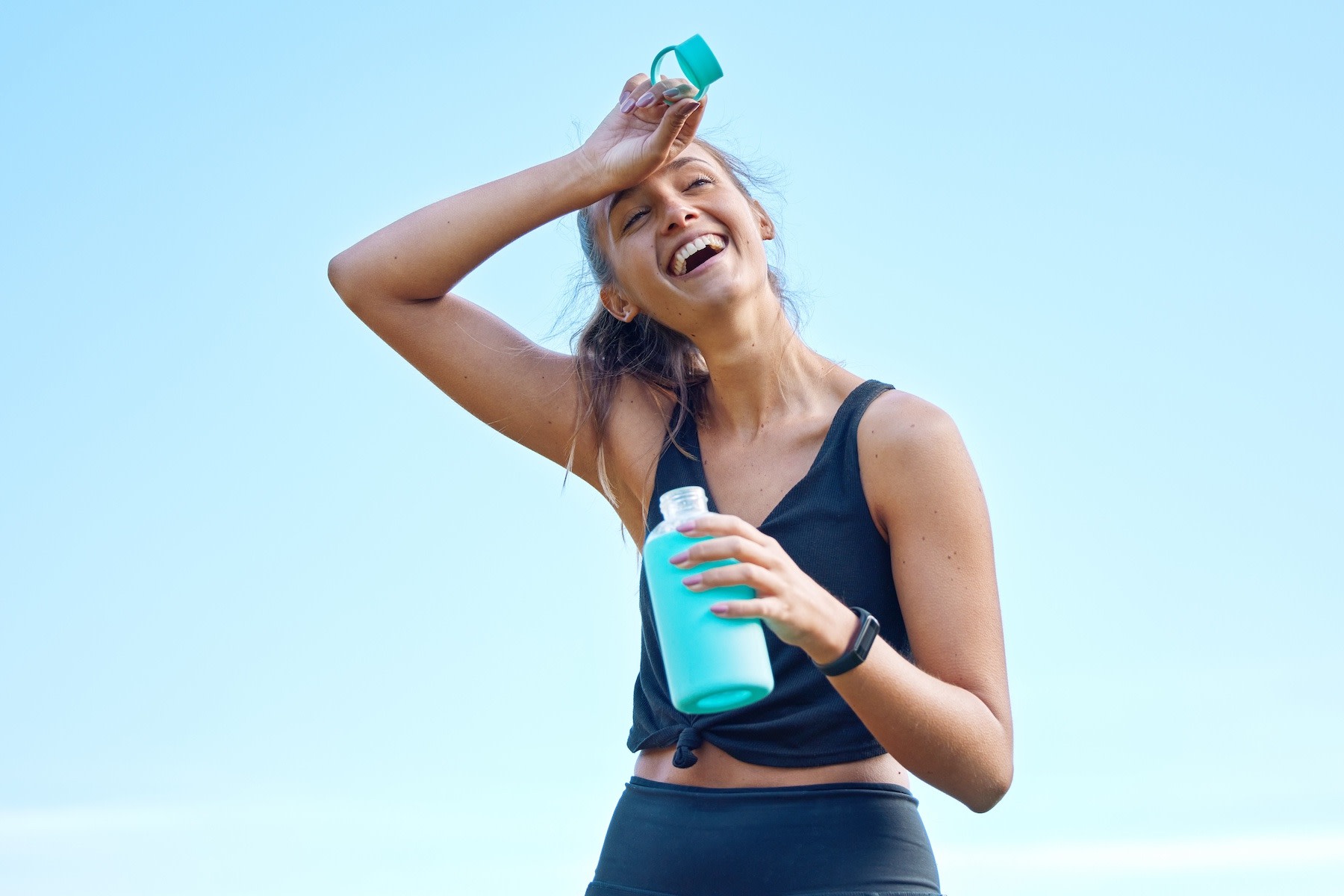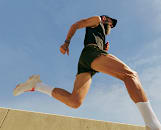
PeopleImages / iStock / Getty Images Plus via Getty Images
Electrolytes Are About More Than Just Hydration. Here Are 5 Key Benefits to Know
Everyone (not just endurance athletes) needs the right balance of electrolytes. Here, dietitians explain why.
By Michele Ross•
What Are Electrolytes?
5 Benefits of Electrolytes
When Do You Need to Consume Extra Electrolytes?
What Are the Best Sources of Electrolytes?
Safety Considerations When Drinking Electrolytes
The Takeaway
If you’ve ever played a sport or done some serious sweating, there’s a good chance you reached for electrolytes before, during, or after said workout. But while your Little League days (or sports drink commercials of the ’80s and ’90s) may have conditioned you to reach for electrolytes after an activity, what actually are the benefits of electrolytes, and how and when do you need to replenish them?
Discover more ways to reach your goals with Peloton
Keep reading for a comprehensive guide to electrolytes—including what they are, the primary benefits of electrolytes, and their top dietary sources.
What Are Electrolytes?
Electrolytes are chemically charged substances, which include:
Sodium
Magnesium
Potassium
Calcium
Chloride
Phosphorus
Bicarbonate
Each electrolyte has its own benefits (and risks, if imbalanced), yet they also have broader commonalities. “In general, maintaining a proper electrolyte balance is very important for hydration status; converting the nutrients we consume into energy; and supporting our cardiovascular, muscular, and neurological systems, among other roles,” explains registered dietitian nutritionist Maddie Pasquariello, RDN, of East Coast Health in Brooklyn, New York.
Are Electrolytes a Source of Energy?
Since many athletes and casual exercisers alike reach for electrolytes on workout days, you might think they provide energy to fuel your workouts. However, Pasquariello says this isn’t really the case.
“Electrolytes are not, in and of themselves, a good source of energy for the body, and an electrolyte beverage should not be consumed as a replacement for a meal,” she says.
But that’s not to say that electrolytes aren’t beneficial for your fitness regimen. While electrolytes themselves won’t give you energy, “being electrolyte-depleted can sap your energy,” Pasquariello says. That's because one of their functions is to help convert the nutrients we consume into energy. That said, the sugar found in popular electrolyte drinks can give you a quick boost during a workout—but these sports drinks aren’t the only way to replenish electrolytes.
In essence, they’re one piece of a larger puzzle that can complement your diet, exercise, and lifestyle regimen.
5 Benefits of Electrolytes
Until now, you might have had a vague sense that electrolytes were good for you in terms of rehydrating and complementing your workouts. Below, we dive deeper into the key benefits of electrolytes:
1. They Support Hydration
Electrolytes are crucial to balance fluid retention, making them helpful for preventing dehydration and water loss. This benefit may very well be electrolytes’ chief claim to fame.
While a normal electrolyte status is closely tied to hydration—and electrolyte imbalances may be connected to dehydration—they’re not one and the same. An electrolyte imbalance indicates a high or low count of these essential minerals in the body, while dehydration points to a lack of fluids in the body.
That said, you’ll still need to consume fluids themselves to keep dehydration at bay.
2. They Support Muscle Function and Prevent Cramping
Muscles are able to contract properly with the support of electrolytes, says Emmaline Rasmussen, RDN, a registered dietitian nutritionist based in Los Angeles and Chicago. Proper muscle contraction helps to boost blood flow and may also help the muscles relax.
“Electrolytes can also help prevent muscle cramping and prolong an intense endurance event, which can help you complete your goal,” Pasquariello adds. Both dietitians cite magnesium as the key electrolyte associated with this benefit.
3. They Support Heart Health
“Electrolytes are what help transmit electrical impulses from the heart cells to the rest of the body,” Rasmussen says. “Having the correct balance supports cardiac (heart) muscles as well as other muscles of the body.”
In particular, potassium, magnesium, and calcium may help decrease the risk of cardiovascular events and risk factors, according to a 2019 review in Critical Reviews in Food Science and Nutrition. (High sodium intake, on the other hand, may heighten the risk of high blood pressure.)
4. They Support Healthy Blood Pressure Levels
Rasmussen says that electrolyte balance is especially crucial to promote healthy blood pressure levels, calling out two electrolytes with heightened involvement: “Some people’s blood pressure may be negatively impacted by excessive sodium intake, especially when in the absence of adequate potassium intake,” she cautions.
While many Americans exceed the RDA for sodium (which is 2,300 milligrams for most healthy adults), Rasmussen says that many people—namely those who don’t consume many fruits and veggies—don’t get enough potassium on a daily basis. (The potassium RDA, by the way, is 3,400 milligrams for adult males and 2,600 milligrams for adult females.)
“When we have inadequate sodium and potassium intake—and/or an incorrect balance between intake of the two—for a prolonged period, or significant electrolyte losses due to excessive sweating, it can affect our hydration status as well,” Rasmussen adds.
5. They Support Nerve Function
Sodium, potassium, and calcium are the main electrolytes that assist the transfer of electrical impulses between nerve cells, according to a 2023 review in the journal Clinical Nutrition and Hospital Dietetics. A balance of these electrolytes is key to avoid the disruption of nerve transmission, which may lead to muscle weakness and cramps, among other risks.
When Do You Need to Consume Extra Electrolytes?
When you think of replenishing your electrolytes, you might envision chugging a brightly colored sports drink or tossing an electrolyte supplement packet into your water bottle. But you’re likely covering your bases on the mineral front if you eat a colorful, plant-forward diet.
“Most people can get enough electrolytes from their diet, assuming that they are regularly consuming a minimum of five fruits and vegetables [combined] a day, along with [following] a generally healthful diet,” Rasmussen says. (If your current intake is lacking, consider this your cue to peruse the produce aisle or your local farmers market during your next grocery haul.)
Electrolyte supplements do have their time and place, however, which Pasquariello lists as:
When you’ll be working out for 90-plus minutes
When it’s very hot outside
When you’re sick
When you’re experiencing diarrhea
“Those who engage in strenuous activity or sweat excessively (such as through use of saunas or at hot yoga) may need additional electrolytes to assist with fluid balance and rehydration,” Rasmussen adds. “Finally, some medical conditions and medications can deplete certain electrolytes, such as potassium, and may need to be addressed under the guidance of a registered dietitian or doctor.”
It’s also worth knowing the signs that may indicate an underlying electrolyte imbalance. According to the Cleveland Clinic, common symptoms include:
Confusion
Irritability
Fatigue
Headaches
Irregular heart rate
Muscle cramps, spasms, or weakness
Diarrhea
Constipation
Vomiting
Numbness or tingling in the fingers and toes
If you experience any of these symptoms, consult your physician to see if an electrolyte imbalance is at play. They may find that you need to reduce or boost your intake of specific electrolytes through whole foods, supplements, or medicine.
If and when it’s a good idea to drink your electrolytes, Pasquariello advises opting for low-sugar or sugar-free options. “All you’re looking for here is the electrolyte content,” she says. Bypass the additives, including sweeteners and artificial colors, to keep your greater health goals in check.

Eleganza / E+ via Getty Images
What Are the Best Sources of Electrolytes?
“Foods will contain the various electrolytes we need—sodium, chloride, potassium, calcium, magnesium, phosphorus, and bicarbonate—in different quantities, which is one reason it's so important to consume a diverse diet,” Pasquariello says. A diverse diet is one that’s ripe with fruits and vegetables (pun intended) and includes plenty of high-quality protein sources, alongside other macronutrients.
Different foods will offer different electrolytes, though some may overlap. For instance, Pasquariello cites dark leafy greens as a good source of magnesium, potassium, and calcium.
Here, she helpfully shares which foods are good sources of specific electrolytes:
Best sources of calcium: yogurt, bananas, broccoli, spinach, sesame seeds
Best sources of potassium: carrots, sweet potatoes, lentils, beans, dried apricots
Best sources of magnesium: black beans, lima beans, brown rice, edamame, almonds, pumpkin seeds, avocado
Best sources of phosphorus: yellowfin tuna, firm tofu, meat, lentils
“Most people don’t need to think too much about getting enough sodium or chloride, as they’re readily available in food we season when cooking at home, eating out, or when buying packaged foods,” Pasquariello continues. Again, many people are getting an excess of sodium especially—and they may need to ask their doctor about reducing (rather than revving up) their intake.
Moreover, she says there’s no inherent need for most people to supplement with bicarbonate (which, unlike the other electrolytes discussed, isn’t a mineral but rather a natural byproduct of metabolic processes). “Even for endurance athletes who may take sodium bicarbonate as part of their supplement regimen, evidence is mixed with regards to how effective it is at improving performance,” Pasquariello shares.
In case you enjoy sipping on electrolytes, you don’t have to stick to sports drinks and electrolyte powders, as a handful of healthy beverages naturally offer these essential minerals, too. “Coconut water contains sodium, magnesium, and phosphorus,” Pasquariello says. “Lemon juice (as well as other citrus fruits) is a good source of sodium, potassium, calcium, and magnesium.”
Other fruit juices, including but not limited to watermelon juice and orange juice, also offer electrolytes. (Just aim to enjoy fresh juice without added sugar whenever possible.)
Safety Considerations When Drinking Electrolytes
“Most people consuming a nutritious diet rich in the above foods and working out for 45–60 minutes a few times a week don’t need an additional electrolyte supplement,” Pasquariello reiterates.
However, if you do choose to drink electrolytes—namely for the reasons outlined above, which are typically related to excessive sweating and electrolyte loss—here a few tips and FYIs to keep in mind, courtesy of Pasquariello:
Watch out for added sugar. Again, electrolyte supplements and sports drinks tend to be high in added sugar, which she warns can hinder your recovery, especially in the case of illness.
Be mindful of excess intake. As mentioned above, most people don't need to worry about getting enough sodium or chloride in their diets, Pasquariello says. In case your intake of these electrolytes is already high—and especially if you need to follow a low-sodium diet, as advised by your physician—you’ll probably need to steer clear of drinks high in them.
You may be low in specific electrolytes. Pasquariello cites calcium and magnesium as two common mineral deficiencies. “Your health provider may choose to have you supplement with these specifically, or boost your intake, before you reach for an electrolyte packet,” she says.
The Takeaway
Many athletes and fitness buffs prioritize electrolytes given their benefits for fluid balance, staving off muscle cramps, supporting cardiovascular health, and then some. But they’re not exactly a good source of energy and definitely shouldn’t replace a healthy snack or meal before your workout. However, it’s still important to maintain electrolyte balance to avoid depleting your energy—and to ward off dehydration and cramps—during your workouts.
You can get electrolytes through a healthy, diverse diet rich in whole foods like fruits, veggies, and lean protein. On the other hand, sweating excessively—whether during a long race, game, or workout; in a sauna or hot environment; or due to illness—will often warrant supplementing with an electrolyte drink. Opt for low-sugar electrolyte drinks whenever possible, and all the while, don’t forget to keep tabs on your intake of good old H2O.

Peloton App
Access thousands of classes with no equipment needed.
This content is for informational and educational purposes only and does not constitute individualized advice. It is not intended to replace professional medical evaluation, diagnosis, or treatment. Seek the advice of your physician for questions you may have regarding your health or a medical condition. If you are having a medical emergency, call your physician or 911 immediately.
This content is for informational and educational purposes only and does not constitute individualized advice. It is not intended to replace professional medical evaluation, diagnosis, or treatment. Seek the advice of your physician for questions you may have regarding your health or a medical condition. If you are having a medical emergency, call your physician or 911 immediately.
Get our latest health stories straight to your inbox
Enter your email to get articles, expert-backed tips, and updates from Peloton sent to your inbox.
By providing your email address, you agree to receive marketing communications from Peloton.
For more about how we use your information, see our Privacy Policy.









